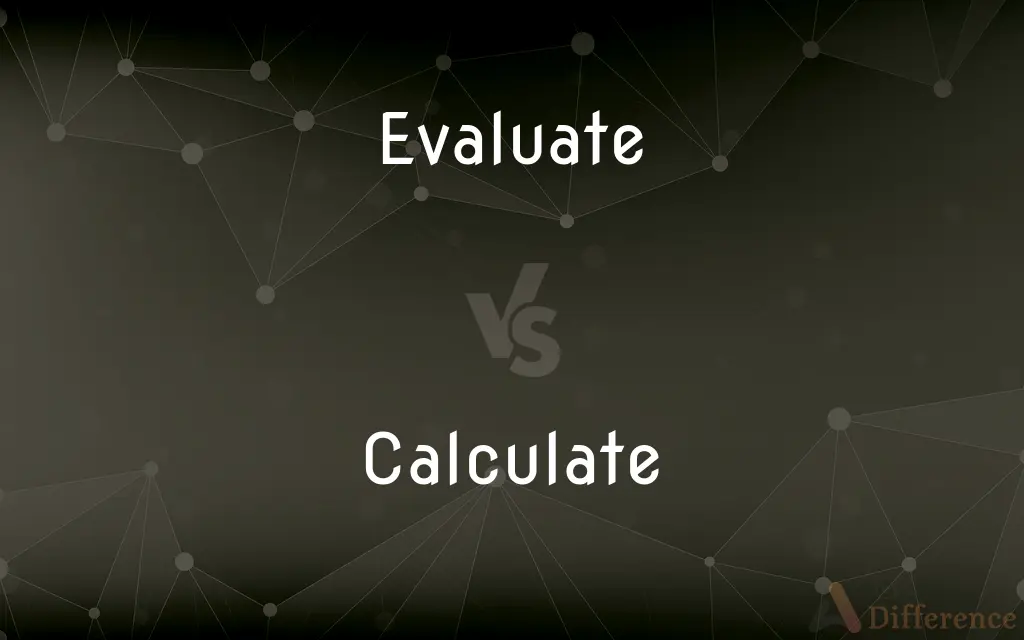Evaluate vs. Calculate — What's the Difference?
By Fiza Rafique & Maham Liaqat — Updated on March 13, 2024
Evaluate involves making judgments about the value, quality, or importance of something, whereas calculate focuses on obtaining a numerical answer using mathematical operations.

Difference Between Evaluate and Calculate
Table of Contents
ADVERTISEMENT
Key Differences
Evaluate is about forming an opinion or estimation about something, often considering various factors and evidence. Calculate, on the other hand, entails using mathematical methods and operations, such as addition, subtraction, multiplication, and division, to find a numerical answer.
Evaluate involves qualitative analysis and subjective judgment to assess the significance, worth, or effectiveness of an object, idea, or situation. For example, one might evaluate the success of a project by considering its outcomes, impact, and feedback from stakeholders. Calculate requires following specific rules and formulas to arrive at a precise value. For instance, calculating the area of a rectangle involves multiplying its length by its width.
When evaluating, the process might involve critical thinking, comparison, and the application of criteria or standards to reach a conclusion. This could include evaluating a piece of art based on its aesthetic appeal, originality, and technique. In contrast, calculating is more about applying algorithms and computational procedures. It often has a definitive answer, like calculating the total cost of items in a shopping cart or determining the distance between two cities using a specific route.
While evaluating can be subjective and open to interpretation, calculation provides objective, concrete results. The former relies more on human judgment and can vary from person to person, whereas the latter is about consistency and universal standards in mathematical operations.
Comparison Chart
Definition
Making judgments about the value, quality, or importance.
Obtaining a numerical answer using mathematical operations.
ADVERTISEMENT
Focus
Qualitative analysis, subjective judgment.
Numerical results, objective data.
Process
Involves considering various factors, evidence, and criteria.
Involves applying specific mathematical formulas and rules.
Outcome
Can vary based on perspective, criteria, and context.
Generally provides a definitive, numerical answer.
Examples
Evaluating a student's performance, assessing a project's impact.
Calculating interest on a loan, determining a budget.
Compare with Definitions
Evaluate
To consider or examine something in order to judge its value, quality, importance, extent, or condition.
Evaluating antique furniture requires knowledge of history and craftsmanship.
Calculate
To compute or determine by numerical methods.
Accountants calculate taxes owed using current tax laws and regulations.
Evaluate
To assess the effectiveness of a plan, policy, or procedure.
The committee will evaluate the new policy's impact over the next six months.
Calculate
To make an estimate of; to reckon.
The app calculates your daily calorie needs based on your activity level.
Evaluate
To use judgment to form an opinion about something.
Critics evaluate a film based on its direction, screenplay, and performances.
Calculate
To solve a mathematical problem.
Children learn to calculate basic arithmetic problems in elementary school.
Evaluate
To judge or determine the significance, worth, or quality of something.
Teachers evaluate students' essays to grade their understanding of the topic.
Calculate
To determine by mathematical processes.
We calculate the total cost by adding the price of each item in the cart.
Evaluate
To determine the significance of something by careful appraisal and study.
Scientists evaluate data from experiments to draw conclusions.
Calculate
To plan or intend for a certain purpose.
The architect calculated the load-bearing capacity to ensure the building's safety.
Evaluate
Form an idea of the amount, number, or value of; assess
The study will assist in evaluating the impact of recent changes
A system for evaluating how well the firm is performing
Calculate
To ascertain by computation; reckon
Calculating the area of a circle.
Calculated their probable time of arrival.
Evaluate
Find a numerical expression or equivalent for (an equation, formula, or function)
Substitute numbers in a simple formula and evaluate the answer
Calculate
To make an estimate of; evaluate
Calculating the team's chances of winning.
Evaluate
To ascertain or fix the value or amount of
Evaluate the damage from the flood.
Calculate
To make for a deliberate purpose; design
A sturdy car that is calculated to last for years.
A choice that was calculated to please.
Evaluate
To determine the importance, effectiveness, or worth of; assess
Evaluate teacher performance.
Calculate
To suppose
"I cal'late she's a right smart cook" (Dialect Notes).
Evaluate
(Mathematics) To calculate the numerical value of; express numerically.
Calculate
To plan, intend, or depend on.
Evaluate
(transitive) To draw conclusions from examining; to assess.
It will take several years to evaluate the material gathered in the survey.
Calculate
To perform a mathematical process; figure
We must measure and calculate to determine how much paint will be needed.
Evaluate
To compute or determine the value of (an expression).
Evaluate this integral.
Calculate
To suppose; guess.
Evaluate
To return or have a specific value.
Calculate
To count, depend, or rely on someone or something
We're calculating on your help.
Evaluate
To fix the value of; to rate; to appraise.
Calculate
To determine the value of something or the solution to something by a mathematical process.
Calculate the square root of 3 to 10 decimal places.
Evaluate
Place a value on; judge the worth of something;
I will have the family jewels appraised by a professional
Calculate
To determine values or solutions by a mathematical process; reckon.
Calculate
To plan; to expect; to think.
Calculate
To ascertain or predict by mathematical or astrological computations the time, circumstances, or other conditions of; to forecast or compute the character or consequences of.
To calculate or cast one's nativity
Calculate
To adjust for purpose; to adapt by forethought or calculation; to fit or prepare by the adaptation of means to an end.
To calculate a system of laws for the government and protection of a free people
Calculate
(chess) To imagine sequences of potential moves and responses without actually moving the pieces.
Calculate
To ascertain or determine by mathematical processes, usually by the ordinary rules of arithmetic; to reckon up; to estimate; to compute.
A calencar exacity calculated than any othe.
Calculate
To ascertain or predict by mathematical or astrological computations the time, circumstances, or other conditions of; to forecast or compute the character or consequences of; as, to calculate or cast one's nativity.
A cunning man did calculate my birth.
Calculate
To adjust for purpose; to adapt by forethought or calculation; to fit or prepare by the adaptation of means to an end; as, to calculate a system of laws for the government and protection of a free people.
[Religion] is . . . calculated for our benefit.
Calculate
To plan; to expect; to think.
Calculate
To make a calculation; to forecast consequences; to estimate; to compute.
The strong passions, whether good or bad, never calculate.
Calculate
Make a mathematical calculation or computation
Calculate
Judge to be probable
Calculate
Keep an account of
Calculate
Predict in advance
Calculate
Specifically design a product, event, or activity for a certain public
Calculate
Have faith or confidence in;
You can count on me to help you any time
Look to your friends for support
You can bet on that!
Depend on your family in times of crisis
Common Curiosities
Is calculating always objective?
Calculating is generally objective as it follows specific mathematical rules to arrive at a numerical answer, but errors can occur in the process.
Can you evaluate without calculating?
Yes, evaluating often involves qualitative judgment and doesn't always require mathematical calculations.
Why is evaluation important?
Evaluation is important because it helps assess the effectiveness, value, and impact of actions, policies, or items, guiding decision-making and improvements.
What are some areas where evaluation is commonly used?
Evaluation is commonly used in education, project management, policy analysis, and performance reviews.
Can evaluating be biased?
Yes, evaluating can be biased since it often involves subjective judgment influenced by personal beliefs, preferences, or information.
How is calculating different from evaluating?
Calculating involves using mathematical processes to obtain a numerical answer, while evaluating is about making judgments based on various criteria and evidence.
What is a common example of calculating?
A common example of calculating is determining the total cost of purchased items by adding their individual prices.
What skills are needed to evaluate effectively?
Effective evaluation requires critical thinking, analytical skills, and the ability to apply specific criteria or standards.
What does it mean to evaluate something?
To evaluate means to judge or determine the value, quality, or importance of something through careful consideration and analysis.
How does technology impact calculating?
Technology, especially calculators and computers, significantly enhances the speed and accuracy of calculations.
Is it possible to calculate without specific data?
Calculating generally requires specific data or information to apply mathematical operations and arrive at a numerical result.
What role does evaluation play in the scientific method?
In the scientific method, evaluation plays a crucial role in analyzing experimental results and determining whether they support or refute a hypothesis.
What's the difference between evaluating a solution and calculating a solution?
Evaluating a solution involves judging its effectiveness or suitability, while calculating a solution involves determining a specific numerical answer.
Can the outcome of a calculation be wrong?
Yes, the outcome of a calculation can be wrong due to errors in data input, mathematical processes, or the application of incorrect formulas.
Do all evaluations involve numbers?
No, not all evaluations involve numbers; many are based on qualitative judgments and criteria.
Share Your Discovery

Previous Comparison
Balloon vs. Orb
Next Comparison
Jetty vs. NettyAuthor Spotlight
Written by
Fiza RafiqueFiza Rafique is a skilled content writer at AskDifference.com, where she meticulously refines and enhances written pieces. Drawing from her vast editorial expertise, Fiza ensures clarity, accuracy, and precision in every article. Passionate about language, she continually seeks to elevate the quality of content for readers worldwide.
Co-written by
Maham Liaqat













































